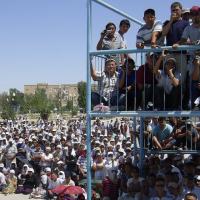
Firm action needed to win all workers’ demands
Earlier this week, in Zhenoazen, which is the centre of the months-old Kazakhstan oil workers’ strike, a meeting took place between Birzhan Nurymbetov, Deputy Minister for Labour, the City Mayor, Orak Sarbopeyev and representatives of the striking workers from the OzenMunaiGaz and KarazhanbazMunai companies. It was attended by representatives of the oil company, the City Prosecutor, the police and other state organisations.
According to the striking workers, Deputy Minister for Labour Nurymbetov acknowledged that the strike was continuing and offered the strikers complete re-instatement in their jobs, although without conceding the payments for dangerous work that triggered the strike. The workers have, for now, turned down this proposal. Further negotiations may take place.
Significantly, the strikers gained the agreement of the minister that their sackings by the company were not legal, as the law courts had still not completed their hearings on the question. By accepting this, the minister de-facto recognised the strike which previously they had said was over. As a sign of “good will”, Nurymbetov proposed to the strikers that all those who had been sacked should be re-instated to their former jobs but on their former wages.
Representatives of the workers rejected this proposal. They argued that although this was one of the main demands of the strikers, it should be carried out along with the release from prison of the strikers’ lawyer, Natalia Sokolova, who was outrageously sentenced to a 6-year prison sentence during the strike. Although The strike started over wages and payments for dangerous work but Natalia Sokolova was arrested and sentenced at the request of the management. The strikers do not want to desert their lawyer.
The Deputy Minister for Labour is no longer talking about finding work for those strikers locked out at other places of work. His rhetoric has completely changed, with his appeal to the strikers to return to their former work places. This is in sharp contrast to the declaration of Timur Kulibayev, the President’s son-in law and head of the main shareholders in the oil company, who claimed the strike was over and 2,500 workers were sacked. His ‘solution’ was to offer 250 unskilled jobs, at considerably lower wages, in other workplaces.
Nurymbetov and his team proposed the start of “supplementary negotiations” next week, with the aim of discussing in detail the demands of the striking workers at the two companies, during which both sides will have an equal number of representatives. They suggested that the strikers should be helped by representatives from the Karaganda “free” trade unions Belkin and Chaika, who have previously demonstrated their loyalty to the Kazakhstan government. These so-called unions helped to undermine the current oil workers’ strike, arguing that the strikers should be found work in other places.
Of course, these initial proposed negotiations, the agenda of which is not clear nor the authority of the participants, will not guarantee the resolution of the strike or that the workers’ demands will be met.
Maximum democratic accountability
As the crisis in Kazakhstan deepens, as workers in other sectors prepare new protests, and with parliamentary elections due early next year, the authorities are eager to resolve the oil strike. They are cautious about using force to end the dispute, for fear of provoking a wider conflict. They have decided to try and resolve the dispute using various types of “intermediaries” from the ‘yellow’ (‘official’) trade unions, in an attempt to find a temporary rotten compromise. It appears they may try and form a “reconciliation commission” i.e. a diversionary talking shop.
It is therefore important that steps are taken to ensure the workers’ negotiators do not agree conditions unacceptable to the strikers. There should be the maximum possible democratic accountability during these discussions, with clear and forceful demands from the strikers.
The striking oil workers should elect their own representatives, with the right to recall them at any stage during negotiations. The workers need to oppose pro-government ‘third parties’ who will not represent the interests of the workers but try to load the balance in favour of the government.
All negotiations should be conducted openly and transparently, and any decisions should be taken by an open vote by the strikers and not by the negotiators. The negotiations should be based around the strikers’ central demand for the release of Natalia Sokolova and the re-instatement of all workers, to avoid splits opening up amongst sacked workers. The re-instatement of just some strikers, while leaving others outside the gates, is the best way the employers can divide the strikers. This would give the employers the possibility of removing worker-activists and leaders. All the strikers should be re-instated to their former workplaces, where they worked before, and not offered other work on worse terms and conditions.
Only by the oil workers and their representatives maintaining a firm, principled position, can a positive result be achieved for the strikers. Gains made can be consolidated by using the experience of the heroic strike to establish a united trade union covering all the oil industry plants, with tried and trusted leaders and fully democratic structures.


Be the first to comment